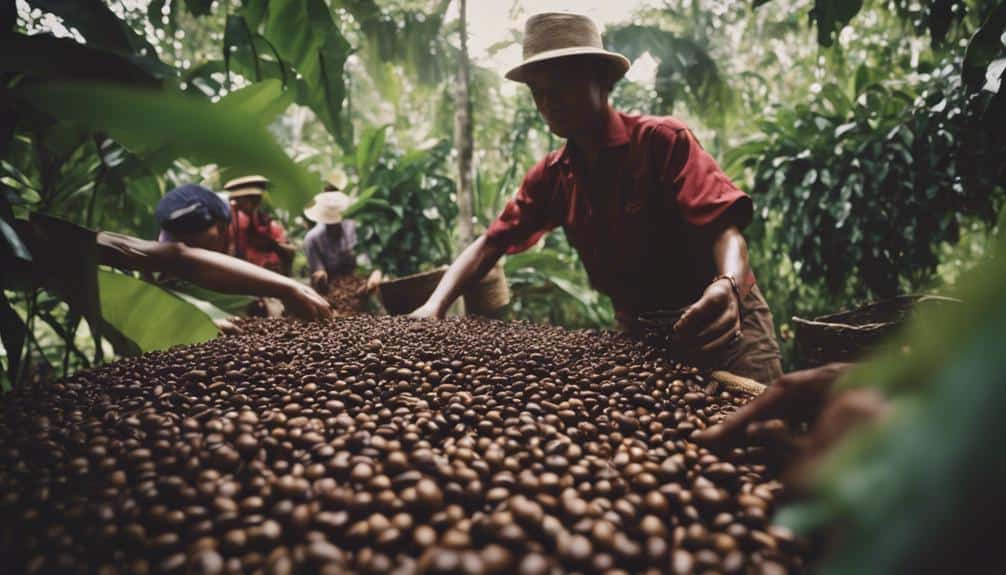Surprising Facts About the Price of Kopi Luwak Coffee

As I explored the world of Kopi Luwak coffee prices, I was taken aback by the intriguing range that this unique brew commands. The disparity in costs per cup left me pondering the factors that contribute to such fluctuations. From the labor-intensive process to the ethical concerns surrounding civet farming, there seems to be a complex web of dynamics influencing the price of this sought-after beverage. But what truly sets apart the high-priced variants from the more affordable options? The answer lies in a blend of scarcity, demand, and quality that makes Kopi Luwak a fascinating subject worth exploring further.
Factors Affecting Kopi Luwak Coffee Price
When determining the price of Kopi Luwak coffee, various factors such as the type of coffee beans utilized, whether they're Arabica or Robusta, play a significant role in influencing the final cost. Kopi Luwak coffee, known for its unique production process involving civets, utilizes these premium beans to create its distinctive flavor profile. Arabica beans, favored for their smooth and aromatic qualities, often command a higher price due to their superior taste compared to the more common Robusta beans.
The use of civets in the production of Kopi Luwak coffee adds to its exclusivity and cost. The meticulous selection process, where wild-sourced or organically farmed beans are preferred, contributes to the expensive nature of this coffee. The scarcity of wild-sourced Kopi Luwak beans further drives up prices, with only around 1,100 pounds produced annually compared to farmed production, which amounts to approximately 50 tons. These factors, coupled with the increasing demand and media exposure, result in Kopi Luwak coffee prices ranging from $5 to $100 per cup, making it a luxurious and sought-after beverage.
Impact of Civet Coffee Scarcity
The scarcity of authentic wild-sourced Kopi Luwak beans greatly impacts both the price and exclusivity of this coveted coffee variety. With an estimated annual production of only around 22 thousand pounds, wild-sourced Kopi Luwak beans are a rare find in the market. This scarcity directly contributes to the high price tag attached to these beans, making them a luxury item sought after by coffee connoisseurs worldwide. The exclusivity of wild-sourced Kopi Luwak is evident in the significant price difference between beans sourced from the natural diet of civets and those from farmed civets. The limited availability of wild-sourced beans drives up their prices, further enhancing their exclusivity.
When shopping for Kopi Luwak, consumers should be wary of blends that claim to contain civet coffee, as many products on the market may only have a minimal percentage of authentic wild-sourced beans. The absence of proper certification for wild Kopi Luwak complicates the identification of genuine and scarce civet coffee, adding another layer of challenge for those seeking the real deal.
Labor-Intensive Production Process

The unique production process of Kopi Luwak coffee involves intricate steps such as hand-collecting civet dung, meticulously sorting beans by hand, and carefully washing, drying, and roasting them. These labor-intensive procedures result in a limited annual production volume of approximately 22 thousand pounds, underscoring the exclusivity of this renowned coffee.
The hand-sorting aspect, among other detailed tasks, notably adds to the high cost and premium pricing of Kopi Luwak coffee in the market.
Unique Coffee Bean Selection
In the intricate world of Kopi Luwak coffee production, a meticulous and labor-intensive process unfolds to select the most exceptional coffee beans through unique methods. Civets, small mammal-like creatures, play an important role in this process by hand-selecting ripe coffee cherries, which are then fermented in their digestive systems.
After excretion, the coffee beans are hand-sorted, washed, and carefully dried to preserve their quality. The enzymes from the civet digestion uniquely impact the taste and aroma of the beans, giving Kopi Luwak its distinct flavor profile.
This labor-intensive production process, involving the hand-collection of civet dung, contributes significantly to the high cost and exclusivity of Kopi Luwak in the competitive coffee market.
Handpicked and Processed
Guiding the intricate process of Kopi Luwak coffee production, the meticulous selection of ripe coffee cherries by civets initiates a labor-intensive journey that culminates in a distinct flavor profile. The handpicked and processed beans undergo a series of meticulous steps that contribute to the premium price of Kopi Luwak:
- Manual Collection of Civet Dung: Workers carefully gather civet dung to extract the coffee beans, ensuring only the finest beans are used.
- Hand-Sorting, Washing, and Drying: Each bean is meticulously inspected, washed, and dried by hand to maintain quality and flavor integrity.
- Quality Assurance: Every step of the labor-intensive production process is executed with precision to deliver a consistent and exceptional final product, justifying its premium price in the market.
Authenticity Concerns in Kopi Luwak Blends
When examining authenticity concerns in Kopi Luwak blends, it becomes important to explore the various verification methods available to guarantee the origin and quality of the coffee.
Ethical sourcing practices play a significant role in addressing these concerns, emphasizing the need for transparency throughout the production chain.
Consumer awareness campaigns can also aid in educating the public about the importance of choosing authentic, ethically sourced Kopi Luwak blends.
Authenticity Verification Methods
One of the key challenges in the Kopi Luwak coffee industry revolves around verifying the authenticity of blends due to the potential inclusion of as little as 1% actual civet coffee. Various methods are being developed to address this issue:
- DNA Testing: Utilizing DNA analysis to identify the unique genetic markers of civet coffee beans, enabling precise verification of authenticity.
- Certification Programs: Establishing stringent certification processes that track the coffee's journey from production to consumption, ensuring transparency and authenticity.
- Microscopic Analysis: Examining the physical characteristics of coffee beans under a microscope to detect any anomalies or inconsistencies that may indicate non-authentic blends.
These methods aim to provide consumers with assurance regarding the origin and authenticity of Kopi Luwak coffee blends.
Ethical Sourcing Practices
An essential aspect of addressing authenticity concerns in Kopi Luwak blends involves implementing ethical sourcing practices to guarantee transparency and accountability throughout the production process.
To combat the lack of certification for authentic wild Kopi Luwak, responsible sourcing becomes imperative. The treatment of civets in Kopi Luwak production, whether wild-sourced or farm-raised, is a vital ethical consideration.
Certified sourcing methods can make sure that civets aren't subjected to poor living conditions such as captivity and an inadequate diet. By prioritizing ethical sourcing practices, consumers can have confidence in the authenticity and ethical standards of the Kopi Luwak they purchase.
It's essential for producers to adhere to responsible sourcing guidelines to uphold the welfare of civets and maintain the integrity of the Kopi Luwak industry.
Consumer Awareness Campaigns
To shed light on the authenticity concerns surrounding Kopi Luwak blends, consumer awareness campaigns play a crucial role in educating buyers about the complexities of this unique coffee market.
Key Points:
- Consumer awareness campaigns highlight the significance of certification to guarantee the authenticity of Kopi Luwak blends.
- Ethical considerations regarding the treatment of civets are a major focus in these campaigns, ensuring consumers are informed about the ethical implications of their coffee choices.
- The role of plantation workers in producing Kopi Luwak blends is emphasized, showcasing their impact on the quality and authenticity of the final product.
These campaigns aim to empower consumers with the knowledge needed to make informed and ethical decisions in the Kopi Luwak market.
Ethical Issues in Farm-Raised Civet Coffee
In the world of Kopi Luwak coffee production, ethical concerns loom large over the treatment of farm-raised civets. The mistreatment of these animals in captivity for the sake of producing civet coffee raises significant ethical red flags. Farm-raised civets used in Kopi Luwak endure poor living conditions and are subjected to restricted diets, leading to high mortality rates among these creatures. The stress and limited diet of captive civets compromise the quality of the Kopi Luwak they produce, affecting both the animals' well-being and the coffee's flavor profile.
Unfortunately, the Kopi Luwak industry's reliance on farm-raised civets contributes to mental and physical health issues in these animals, further exacerbating the ethical concerns surrounding their treatment. The ethical dilemmas surrounding the mistreatment of farm-raised civets highlight the need for greater awareness and potential reforms within the industry to safeguard the well-being of these animals and the sustainability of Kopi Luwak coffee production.
Market Price Fluctuations

Market price fluctuations in the Kopi Luwak coffee industry are influenced by various factors such as sourcing, quality, and consumer demand. Here are key points to take into account:
- Wild-Sourced Kopi Luwak: The wild-sourced variety, harvested from the natural diet of civets, commands higher prices due to its limited availability and distinctive flavor profile.
- Quality and Rarity: Prices for Kopi Luwak coffee can vary greatly, ranging from $5 to $100 per cup, depending on the specific type and quality of the beans.
- Rising Prices: Media exposure and increasing consumer demand have led to a surge in the prices of Kopi Luwak coffee in the market. As awareness of this unique coffee grows, the demand for wild-sourced Kopi Luwak, with its unparalleled flavor, continues to drive prices upwards.
High Demand Vs. Low Supply Dynamics
The surge in media exposure and growing consumer interest in the unique flavors of wild-sourced Kopi Luwak coffee have greatly influenced the high demand versus low supply dynamics in the market. Kopi Luwak, with its limited annual production of around 22 thousand pounds, faces high demand globally, contributing to its exclusivity and high prices.
The low supply of authentic wild-sourced Kopi Luwak further exacerbates its scarcity and cost. The increased media attention has heightened the demand for this exotic coffee, leading to a continuous impact on its price point.
Importantly, wild-sourced beans derived from the natural diet of civets command higher prices due to the extensive harvesting efforts involved in their production. This delicate balance between high demand and low supply underscores the exclusivity and rarity of Kopi Luwak, making it a sought-after and premium commodity in the coffee market.
Worthiness of Investing in Kopi Luwak

Investing in Kopi Luwak demands a discerning approach due to the intricate process involved in its production and the varying levels of authenticity within the market. When considering the worthiness of investing in this expensive coffee, several key factors need to be taken into account:
- Authenticity Concerns: The high price of Kopi Luwak stems from its unique production process involving civets. However, some blends labeled as Kopi Luwak may contain minimal amounts of actual civet coffee. This lack of transparency can impact the investment value of the product.
- Certification Challenges: The absence of a certification system for authentic wild-sourced Kopi Luwak raises doubts about the quality and authenticity of the coffee being sold. Potential investors need to carefully validate the source and authenticity of the coffee they're purchasing.
- Role of Plantation Workers: Plantation workers play an essential role in the production of Kopi Luwak, influencing its price and availability in the market. Understanding the labor practices and conditions of these workers is essential for ethical investment considerations.
Conclusion
To sum up, the price of Kopi Luwak coffee is influenced by various factors such as scarcity, production processes, authenticity concerns, and market dynamics.
The high demand for this exclusive coffee, coupled with limited supply from wild-sourced beans, contributes to its premium price range.
Despite fluctuations in the market, investing in Kopi Luwak remains a lucrative option for coffee enthusiasts looking for a unique and luxurious experience.





